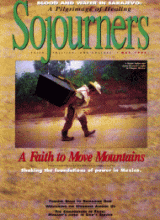Without doubt most Sojourners readers have an answer to the question: With whom do I form community? Indeed we could even say that all people of faithand probably most human beingscan name their community. It's an ominous gap not to be able to do so. Our communities may not conform to any blueprint, but we know we have them.
That's why we keep insisting in these pages that community comes in all kinds of shapes and sizes. I once knew two elderly shut-ins, longtime friends, both of whom lived alone. Every day they watched a religious program on television and as it ended each would offer a prayer for the other. They knew who formed their unique community.
The main requirement for community seems to be that the individual have a sense of forming part of a group, and that the group acknowledge that fact and act on it. A missionary from Africa once told me how they celebrated Communion in a young Christian community there. At Communion time members of the gathering would hurry from the altar with portions of the bread so that the sick would receive it at the same time as those present at the service. No doubt about membership in that community.
Why is community a near-universal experienceespecially for people of faith? One person put it this way: "Community is God's strategy for reaching the world." That's a neat way of saying that as communityrather than as individualswe model what God has in mind for humanity. Think of what community demands of us: commitment, selflessness, concern for the common good, humility, large doses of patience, forgiveness. These are New Creation values, the ones Jesus outlined in the Sermon on the Mount as his guidelines for God's reign among humans.
Read the Full Article
